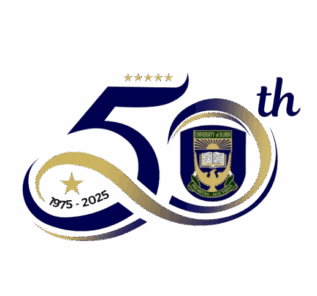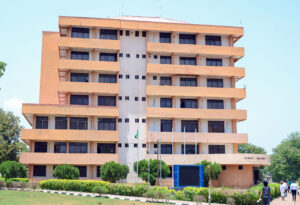By Tajudeen Babamale
The Vice Chancellor of the University of Ilorin, Prof. Wahab Olasupo Egbewole, SAN, has pledged the University’s full cooperation and collaboration with the newly established Strategic Intelligence Management Institute (SIMI) in the execution of its mandate.
Prof. Egbewole gave the assurance last Wednesday (May 28, 2025) when he received members of the management team of the Institute, led by its Director of Studies, Ambassador Gbara Awane, who visited him ahead of the team’s interaction with the staff of the Faculty of Agriculture, University of Ilorin.
`The Vice Chancellor stated that as a knowledge-generating institution, the University of Ilorin is always open to collaborations aimed at improving the country’s socio-economic and security landscape. He noted that knowledge and research are critical to moving Nigeria forward, especially in the face of growing national and global challenges.
Prof. Egbewole also commended the choice of Kwara State and the University of Ilorin, in particular, as the operational base for SIMI, describing it as a strategic decision considering the state’s central location in Nigeria’s geographical makeup. According to him, initiatives that begin from the center are more likely to achieve broader national impact.
While acknowledging the significance of SIMI’s focus on agriculture, the Vice Chancellor said that food security plays a fundamental role in national security. He lamented the persistent challenges in Nigeria’s agricultural sector, particularly the ongoing conflicts between farmers and herders, hoping that the Institute’s research and other activities would contribute significantly to resolving such issues.
Prof. Egbewole also explained the importance of theoretical frameworks in addressing practical problems, asserting that meaningful progress in Nigeria requires intellectual contributions that can be translated into actionable strategies.
He, however, encouraged SIMI to see the University of Ilorin as a committed partner in its efforts to address strategic intelligence and national development.
Earlier in his remarks, the Director of Studies of the Institute, Amb. Gbara Awane, said the visit was driven by the rapidly changing global order marked by significant geopolitical shifts and the rise of disruptive technologies. He said that these global dynamics are having far-reaching impacts on various sectors, especially agriculture.
Amb. Awane said that the delegation was at the University of Ilorin and Kwara state in general to understand the agricultural ecosystem of the state, assess existing infrastructure, evaluate the value chain, and identify areas where Nigeria could potentially benefit from current global developments.
He said, “One major global issue identified by the Institute is the ongoing trade tensions between the United States and China, particularly in the area of agricultural commodities. Recent tariff increases by the U.S. government, some reportedly exceeding 145%, have disrupted global trade flows, especially in soybean exports. China, once the largest importer of soybeans from the United States, has significantly reduced its imports due to the high tariffs”.
He added that “SIMI believes that this disruption presents an emerging opportunity for Nigeria to position itself as a key player in the global soybean market. By strengthening its agricultural base, particularly in soybean production, Nigeria could step in to fill the supply gap left by the U.S.-China standoff. The Institute is working to assess whether the current infrastructure and agricultural practices in Kwara State can support such a transition”.
Amb. Awane said that the ultimate goal of the institute was to compile comprehensive insights and policy recommendations that will be submitted to the federal government. According to him, these findings are intended to help Nigeria to be better prepared for future challenges and capitalise on emerging global opportunities in both agriculture and geopolitics.
Also in her remarks, the Dean of the Faculty of Agriculture, Prof. Oluyemisi Bolajoko Fawole, said the Institute’s visit was centered on understanding and assessing the agricultural ecosystem of the state, with the University’s Faculty of Agriculture identified as a key stakeholder in this strategic effort.

